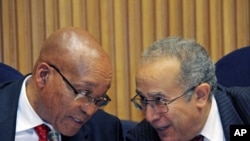The African Union (AU) is ready to work with stakeholders in Libya to build a democratic society, following the ouster of long-time leader Moammar Gadhafi.
Ambassador Ramtane Lamamra, commissioner for Peace and Security of the African Union, said “The situation in Libya is now mature for democratic transformation process.”
“We certainly hope,” he continued, “that the United Nations has a vision to support the transition in Libya, I hope the international community will continue to be mobilized for the sake of helping the Libyans to overcome the consequences of the tragedy of the civil war.”
He also expressed hope the international community will help Libya lay the foundation for a striving democracy and for the overall development of the North African country.
Last week, some African heads of state and government that are members of a high-level ad hoc committee of the African Union, met in Pretoria, South Africa to find solutions to concerns about the Libya conflict.
“The heads of states did confirm Africa’s posture, constant position on the issue and that is the need to promote both democracy and peace in Libya,” said Lamamra. “This has been our position since March 10 when the African Union elaborated on its roadmap and appointed a panel of five heads of state to implement it in close association with the Libyan parties and in close cooperation with the major international actors including the U.N.”
He adds that the AU has been closely following developments in Libya to help normalize the situation there.
But, critics say the continental body has failed to resolve the conflict.
Some observers have expressed concern that the NTC faces a test implementing law and order after rebels deposed Mr. Gadhafi’s government. Lamamra echoed similar sentiments.
“The order of the day in Libya is precisely how to complete the re-establishment of law and order throughout the country. And also to form an all-inclusive government, which will be called to complete the task of the transition… so that the Libyan people within a matter of months can elect their own leaders freely and democratically,” said Lamamra.
He also said the African Union has experience in assisting countries recovering from civil war in building democratic institutions.
“The African Union stands ready to help all the stakeholders open up a new chapter in the history of the country and to lay really the foundations for a better future for the entire Libyan people,” said Lamamra.




